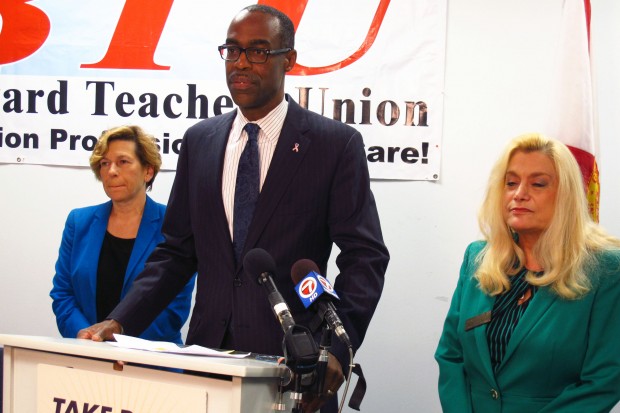Broward Schools Want Changes To Evaluations And High School Schedules

Broward schools superintendent Robert Runcie, American Federation of Teachers president Randi Weingarten, left, and Broward Teachers Union president Sharon Glickman, right, announced the creation of two task forces to recommend changes to teacher evaluations and high school schedules.
Broward County school and union leaders want to make changes to test-based teacher evaluations and the county’s high school schedule.
Superintendent Robert Runcie announced two task forces will study the issues and recommend changes.
One goal is to come up with a teacher evaluation system that is less about punishing teachers who earn low scores than it is about training, mentoring and helping those teachers improve.
But the task force is also related to the backlash against the many ways students’ standardized test scores are used. Florida law requires half of a teacher’s evaluation score is based on whether students miss, meet or exceed expected results on state tests.
“As educators, administrators, we need data,” Runcie said. “We need information to constantly guide our practice and where we’re going. So, there’s always going to be some types of assessment.
“We want to change the dynamic…We want to change the conversation around how assessments are used, period.”
Runcie was joined by Randi Weingarten, president of the American Federation of Teachers, and Sharon Glickman, president of the Broward Teachers Union. AFT and the nation’s largest teachers union, the National Education Association, have led the fight against the widespread use of standardized test scores.
In Florida, those scores are tied to decisions about which students graduate or advance to another grade, school and district performance ratings and teacher pay.
The high school task force will work on ways to reduce work loads for teachers who have seen their class sizes swell in recent years.
State law limits the number of students in core courses such as math and English, and fines districts which fail to meet the requirements. Broward had been paying millions in fines when Runcie took control of the district. To reduce those fines, he switched the district to a seven period schedule from a four period schedule.
But that change meant teachers had to teach more classes each day. And union leaders said the district hired more teachers in core subjects. That meant teachers of elective courses, such as art, saw classes swell to several dozen students and some had as many as 200 students enrolled in their classes.
Runcie said the goal was to reduce both class sizes and the amount of work on high school teachers.
Unlike other districts, Runcie said Broward schools’ leadership and the union wanted to work together on solutions.
“It is showing that regardless of what’s happening in Tallahassee,” Weingarten said, “the management of this system and the union in this system – those closest to kids – are going to work together to help kids succeed.”
But it’s yet to be determined what kinds of changes the district will be able to make. State law requires annual testing of every student and that those results are used as part of a teacher’s evaluation.
“I believe we have a lot of control, locally, over our own destiny,” Runcie said, “and I think we can set an example for the rest of the state.”
But even if the district can’t make the recommended changes itself, Runcie said sending a plan to state lawmakers was a good step.
“You can’t continue to go to the state and your position is ‘No, we’re not doing it,'” he said. “We need to come up with alternatives and say ‘Hey, look. We’ve taken a really hard look at this. We’ve worked together. And here’s an alternative that we think is better.’”
The two task forces will start with a half-dozen members a piece, with half chosen by the union and half chose by the district. Runcie said parents and students will be included.
Runcie also said the district will be reviewing its testing schedule and could recommend trimming some exams, as neighboring Miami-Dade schools did earlier this month.

